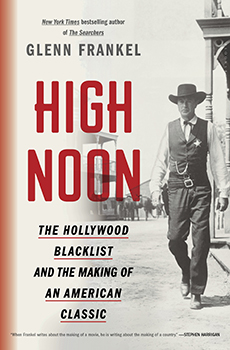Years of risking his life to protect his fellow citizens come to this climactic movie moment: The lawman, his gun still hot from a showdown with an outlaw, tosses away his badge, a rejection of the society that has come to disrespect if not loathe what he represents.
For many baby boomers that scene brings to mind “Dirty Harry,” the 1971 crime thriller starring Clint Eastwood that questioned the state of American justice. Others, however, think of “High Noon,” a 1952 Western featuring Gary Cooper as Marshal Will Kane. He finds no help from the citizens of Hadleyville when a gunman comes to town seeking vengeance.
Instead of real-life concerns about crime and justice in the 1950s, director Fred Zinnemann’s film can be taken as a meditation on the Hollywood blacklist. The marshal who goes from house to house and friend to friend begging for help is not unlike the blacklisted screenwriters, directors and stars who found themselves to be pariahs for refusing to name others who were or had been members of the Communist Party.

Such a reading of a low-budget Western isn’t a stretch when you know the backstory provided by “High Noon: The Hollywood Blacklist and the Making of an American Classic.” Mixing elements of biography, social history and film analysis, author Glenn Frankel uncovers drama and tragedy not usually found in discussions of moviemaking. His detailed narrative is a primer for those who don’t understand how the blacklist era endangered free speech and other constitutional values.
Screenwriter Carl Foreman found himself in Kane’s boots as his former ties to the Communist Party surfaced while “High Noon” was in production. Ultimately he lost his assistant producer’s credit on the film, sold his share in the production company behind it and spent years in self-imposed exile in Britain.
Even then, Foreman had to hide his talent, forgoing credit (and an Academy Award) for writing the screenplay to 1957’s “The Bridge on the River Kwai.” (The film academy in 1984 added Foreman’s name to the “Kwai” credits. An Oscar was presented to his widow.)
And what about that all-American male named Gary Cooper? As his friend Carl Foreman sought help, Cooper was less like Will Kane and more like the townsman who first offers to stand with the marshal but then, when no one else joins the effort, backs out. Indeed, Cooper took a public stand alongside Foreman until the conservative press criticized him for it. He ended up with his second Academy Award — for portraying a man of courage and principle.
Looking back, it’s difficult not to see heroic traits in the victims who tried to resist the blacklist and in those who tried to help them — and villainy in those who set about ruining lives for political and personal gain. (AP)




